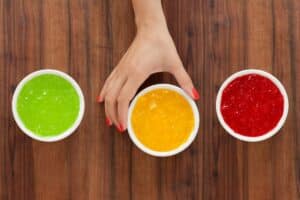Unless you’re a consummate baker, vanilla extract is one of those ingredients that might be on standby for a long time just waiting for an opportunity to bring some deliciousness to our culinary exploits.
![Does Vanilla Extract Go Bad? [All You Need To Know]](https://www.foodchamps.org/wp-content/uploads/2023/05/Does-Vanilla-Extract-Go-Bad-All-You-Need-To-Know.jpg)
As such, when we finally need it, that little bottle might well be covered in dust, veiled in cobwebs, and generally looking a little worse for wear. But does that mean that the contents of the bottle has degraded too? Can vanilla extract even go bad?
Well, the quick answer is yes… and no. Should you use that old vanilla extract that’s been hiding at the back of your cupboard for years? Stick with us to find out!
How Long Does Vanilla Extract Last?
There are two kinds of vanilla extract. One is completely pure and natural, while the other is synthetic, an imitation of the pure version.
To be fair to imitation vanilla extract, it’s almost as flavorful as the pure extract, but when it comes to staying power, there’s no substitute for the real deal. Assuming it’s stored correctly, pure vanilla extract will last indefinitely — Hooray!
Yep, you read that correctly; the pure stuff has some real legs on it. And although the flavor might intensify over the years due to the evaporation of the alcohol base (if the bottle has been opened), the quality will, by and large, be intact.
You can dip into well-looked-after pure vanilla extract 5, 10, 15 years after buying and opening it and it will still deliver in terms of flavor. Imitation vanilla extract, on the other hand, doesn’t keep all that well, comparatively speaking.
Don’t get us wrong, it’ll still outlive most of the ingredients in your kitchen, but it will expire before its pure equivalent. The quality of imitation vanilla extract in an opened bottle will degrade over time, eventually reaching a point that most would consider bad.
As a general rule, you can expect it to last between 6 months and a year longer than the best-before date on the bottle.
What’s The Best Way To Store Vanilla Extract?
Both pure and imitation vanilla extracts benefit from the same storage methods. Ideally, your extract should sit in a cool, dark place or at least well away from direct sunlight and other heat sources.
A pantry is a safe bet, as is any old cupboard providing it’s not next to your oven. Refrigerating or freezing vanilla extract is strictly out of the question as exposure to cold can be just as damaging as heat exposure.
Keep the bottle unopened for as long as possible, and once the seal is broken, be sure to secure the lid tightly back in place. Loose lids are a surefire way to trigger oxygenation and expedite the deterioration of the extract.
Is It Possible To Tell If Vanilla Extract Has Gone Bad?
There are a few telltale signs that vanilla extract has gone bad. An odd smell is the easiest to identify, as you should get a good whiff of it as soon as you pop the cap. Off vanilla extract has quite an aggressive smell, sort of alcoholic but not at the same time.
It’s a far sight from the subtle sweetness of the liquid when new, so you really can’t miss it. Some sort of bacterial growth on the inside of the cap is another good indicator that it’s time to toss your vanilla extract in the trash.
This usually means that the cap hasn’t been secured for some time, or perhaps that a foreign food entity found its way there before you put the lid back on the bottle.
And finally, if you used plenty of vanilla extract, but the flavor isn’t coming through in the slightest in your food, it’s too far gone, and although it may not smell bad, is now completely useless.
Not to worry, though. As we mentioned earlier, as long as you take care of your vanilla extract, it’ll stand the test of time — Look after your vanilla juice, and your vanilla juice will look after you!
Final Thoughts
Vanilla extract is one of the hardiest ingredients around, even in its inferior synthetic form, which is fantastic news for the sporadic, once-every-few-years bakers out there.
Granted, imitation extract deteriorates faster and in more noticeable ways, but it will last a fairly long time if cared for correctly. Pure vanilla extract, by contrast, is nigh-on invisible. Keep it cool, keep it dry, keep it sealed, and it may well outlive us all.
Frequently Asked Questions
Let’s wrap this vanilla extract investigation up with a quick FAQ session.
The primary difference between pure and imitation vanilla extract is the production process. Pure extract is derived from natural vanilla beans, while imitation vanilla extract is synthesized in a laboratory.
As advanced as human technology is, we can never quite pip nature, as evidenced by the simplicity of imitation vanilla extract compared to highly complex pure specimens.
Synthetic extract contains only one critical flavor compound, vanillin, and while this is also the key constituent in pure extract, the real stuff also contains a wealth of other naturally occurring compounds that add richness and nuance to the flavor profile.
It’s absolutely possible to produce vanilla extract at home, but you’ll need lots of vanilla beans and plenty of vodka to do so. The beans will need to steep in the vodka for a minimum of 8 weeks, but even then, the flavor will be quite faint.
In order to maximize the flavor of your homemade extract, be prepared to let the beans infuse the vodka for a whole year.






